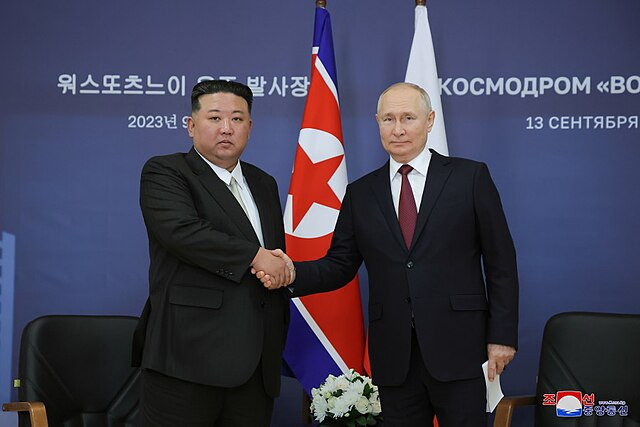North Korea has sent an additional 3,000 soldiers to support Russia's war in Ukraine this year, according to an assessment by South Korea's Joint Chiefs of Staff released Thursday. The deployment, which took place in January and February, brings the estimated total of North Korean troops sent to Russia to 11,000 since the war began. About 4,000 of them have been killed or injured, South Korean officials said.
The fresh infusion of troops underscores Pyongyang's intensifying role in aiding Moscow's military campaign, amid growing concerns that North Korea is gaining advanced military technology in exchange. North Korea's support is "expected to increase according to the situation," South Korea's Joint Chiefs said, citing large-scale transfers of missiles, artillery and rocket launchers already delivered.
North Korea's military contributions include a "significant amount" of short-range ballistic missiles, 170mm self-propelled howitzers, and 220 units of 240mm multiple rocket launchers. Since late 2023, North Korean troops have operated primarily in the Kursk region of Russia, where Ukrainian intelligence says they have served as front-line reinforcements. However, the contingent withdrew from combat zones earlier this year following reports of high casualties and harsh battlefield conditions.
Ukrainian and South Korean intelligence agencies attribute the high losses among North Korean units to their difficulty adapting to drone-centric warfare and the use of outdated tactics by Russian commanders. The North Koreans have reportedly been deployed without adequate rear support, leading to mass casualties. CNN previously reported that some North Korean troops had used grenades on themselves rather than be captured.
The reinforcements come as Russian Deputy Foreign Minister Andrey Rudenko confirmed that preparations are underway for a potential visit by North Korean leader Kim Jong Un to Moscow. This follows a meeting last week in Pyongyang between Kim and Russian security chief Sergei Shoigu, during which the two reaffirmed a mutual defense pact signed in 2023.
"He pays the utmost attention to the implementation of agreements reached with you," Shoigu told Kim, according to TASS.
The United States has warned that Russia may be close to sharing sensitive military and space technologies with North Korea in return for its support. Moscow is already providing coal, food, medicine and other supplies, and has even facilitated vacation programs for children of Russian troops killed in Ukraine, according to Russia's ambassador to Pyongyang, Alexander Matsegora.
Meanwhile, North Korea's weapons development has continued apace. State media KCNA reported that Kim Jong Un this week oversaw tests of newly developed reconnaissance and attack drones, including explosive drones capable of striking moving targets. Kim directed that production of such weapons be expanded, emphasizing drones and artificial intelligence as "top" military priorities.
Photos released by KCNA showed Kim observing a large surveillance drone resembling the U.S. RQ-4B Global Hawk and inspecting a possible airborne early-warning aircraft that South Korean officials say may incorporate Russian components. South Korea's Joint Chiefs of Staff spokesperson Lee Seong-jun said, The "internal equipment and such parts could be related to Russia."
While the aircraft's combat readiness remains unverified, its development illustrates North Korea's increasing reliance on foreign technology to close gaps in its defense capabilities. "As you can see, it looks quite cumbersome and we assess that it's likely vulnerable to interception," Lee said.
On the battlefield, drone warfare remains a dominant factor. Russian drone attacks on Ukraine rose from 379 in May 2024 to nearly 2,500 by November. Late Wednesday, Russia launched another drone assault on the northeastern Ukrainian city of Kharkiv, injuring at least nine people and damaging civilian infrastructure.
"No country should have to go through this," Ukrainian President Volodymyr Zelensky wrote on Telegram after the attack.






